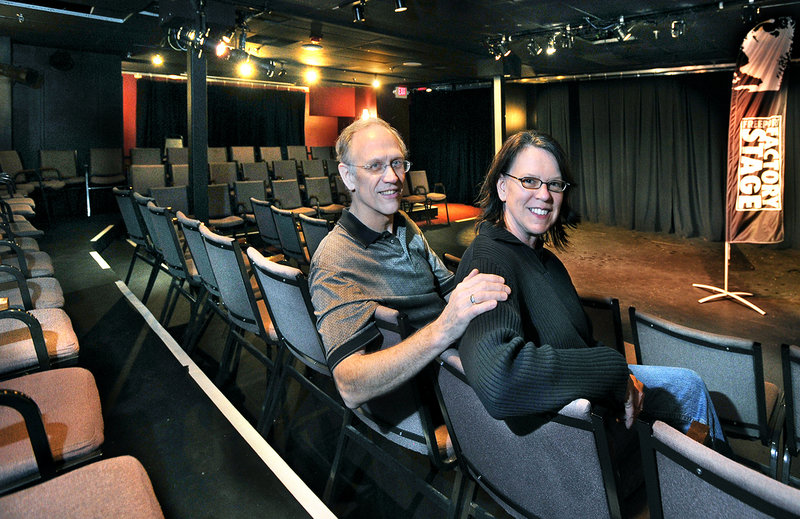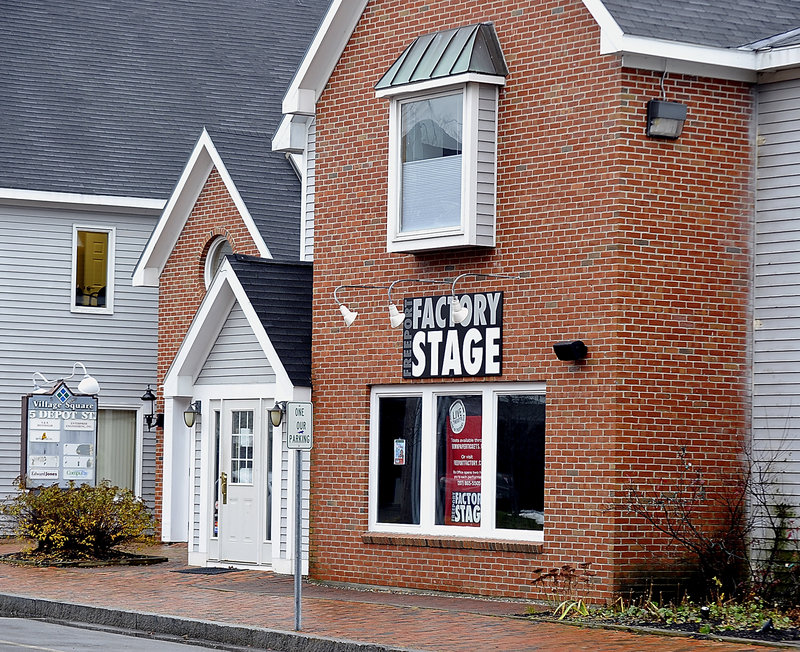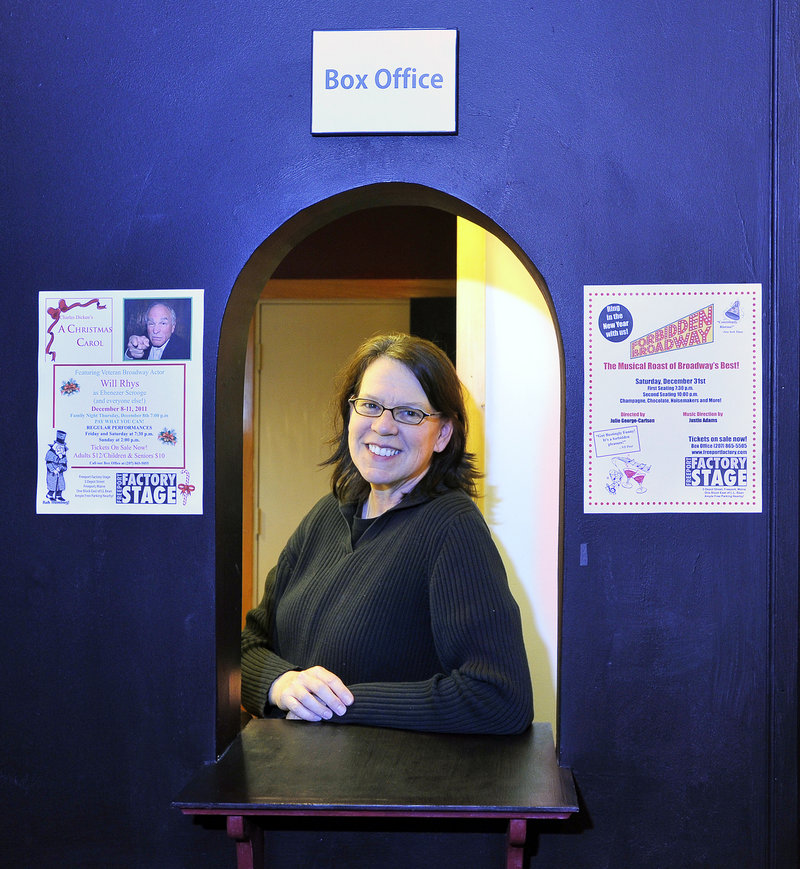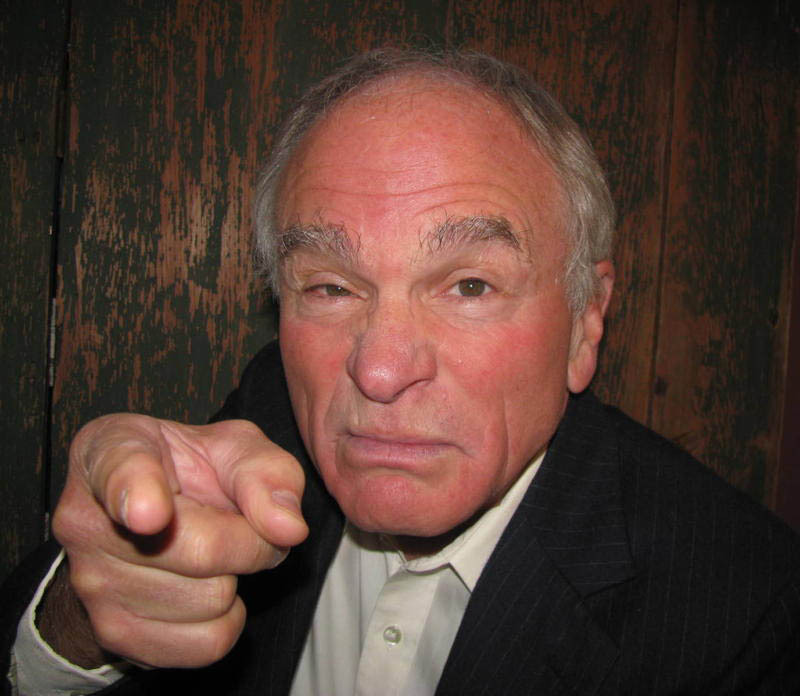FREEPORT – A month ago, Bud Carlson felt certain he would not be hawking tickets to an upcoming Christmas show.
He and his wife, Julie George-Carlson, decided to close the 99-seat black box theater they’d been running since the spring, Freeport Factory Stage.
They had some success, and people seemed to like the shows. The last weekend of “Macbeth” sold out.
“But people can applaud you to death. We had no money left. We sunk everything we had into this place,” Carlson said.
With the building lease about to expire, the Carlsons decided it was time to pull the plug on their grand experiment of bringing professional theater to Freeport. Despite their artistic success and respectable ticket sales for most of the nine shows they hosted since their May opening, they struggled to pay the bills.
But a funny thing happened on the way to the closing.
As soon as Carlson hit “send” on an email announcing the couple’s intent to close Freeport Factory Stage, they were inundated with phone calls and emails from folks imploring them to give it more time.
“People said, ‘No, don’t. You got something good going. You’ve got to stay at it longer,’ ” Carlson said.
So instead of closing, Freeport Factory Stage is still very much open for business. It will host a one-man version of Charles Dickens’ “A Christmas Carol” beginning Thursday starring Broadway veteran Will Rhys, who now lives in Bridgton. There’s a social mixer on tap for next week, and on New Year’s Eve, the theater will present two performances of “Forbidden Broadway,” a musical send-up of Broadway hits.
The survival of this small theater, tucked in the heart of a retail complex in a town best known for shopping and factory outlets, takes on a David-and-Goliath quality. The Carlsons, founders of the Freeport Shakespeare Festival, believe Freeport has a lot more going for it than retail.
And they want their theater to become a magnet for those who love theater and appreciate professional-quality shows.
They also believe they are close enough to Portland to draw audiences up I-295 and I-95, and close enough to Brunswick and the Midcoast to bring people down as well.
They just need to figure out a way to pay the bills.
Their original business plan involved taking advantage of the space, which, when they assumed the lease in the spring, had already been built out as a performance hall featuring mostly live music. They made some changes to the space to make it more theater-friendly, and began booking existing shows that did not require much artistic development on their part.
In the spring, both were focused on the summer Shakespeare festival, so they wanted to bring in ready-made shows. For the summer, their hope was to use Freeport Factory Stage as a secondary location for festival events.
That plan played out as they envisioned. The problem was, it didn’t generate enough income. Ticket and concession sales did not cover their costs, and they found themselves paying rent out of their own pocket.
George-Carlson, who serves as executive and artistic director of the Shakespeare festival (presented the last two summers at L.L. Bean Discovery Park), thinks part of the reason for the misfire was the theater’s lack of identity. With few exceptions, the shows they presented represented someone else’s artistic vision.
“We brought in existing pieces. We had a few comedy acts, musicals and pre-set plays — things we didn’t have to think about,” she said. “People asked, ‘What are you? Are you a theater? Are you a comedy place?’ “
Over the summer and early fall, they began to rethink their strategy.
“I think what we learned is this: Audiences seem to follow people, not a physical place,” Carlson said. “You look at the success of a theater company like Good Theater or Acorn (Productions), and it’s because audiences know and appreciate the work of Brian Allen and Mike Levine,” he said, citing the artistic directors of two of Greater Portland’s most respected theater companies.
“We were not developing that. We were just bringing in acts.”
At the end of summer and with the Shakespeare festival behind them, the couple adjusted their strategy. They presented two fall shows that they originated themselves, “ART” and “Macbeth.” Both did well, earning positive reviews and decent attendance.
Ticket sales for the first weekend of “ART” were, in George-Carlson’s word, “abysmal.” But the second weekend was good, and the third weekend was sold out — the first sellout at Freeport Factory. Attendance at “Macbeth” was solid and consistent; half the run was sold out.
But by then, it was too late. The Carlsons could not spend any more of their own money on a venture so risky. “We faced our watershed moment the last night of ‘Macbeth.’ We were sold out, but had no money left. We sunk everything we had into this place,” George-Carlson said.
That’s when the e-mail announcing the closing went out — and when they heard from people who asked them to rethink their decision. The response forced them to decide whether to continue or not.
At the heart of their decision lies a philosophical absolute: Theirs is not a community theater. They respect the artistic process, and pay actors a decent stipend. They want their theater to be a place where actors desire to work. They will not ask them to work for free. Freeport already has a community theater, and they are not interested in competing.
To achieve their goal, the Carlsons have begun the process of becoming a nonprofit arts organization, and are assembling a board to guide the way. By becoming a nonprofit, they avail themselves to grants and fundraising.
They also renegotiated their lease to make it slightly more affordable.
They’ve scheduled a social mixer for Dec. 13 to introduce people to the theater, have booked shows for December that they hope will draw good crowds, and are pursuing an aggressive winter and spring schedule that includes a February production of the Tennessee Williams play “The Glass Menagerie.”
Also on the docket is the Billie Holiday show “Lady Day at Emerson’s Bar and Grill” and something Shakespeare-related. The Stephen Sondheim musical “A Little Night Music” is also in the mix.
For his part, Rhys, the actor doing “A Christmas Carol” this week, hopes Freeport Factory Stage takes hold. He has spent 40 years in theater, on Broadway, Off Broadway and Off-Off Broadway. He worked as artistic director at Cleveland Playhouse for a decade, and spent many years doing regional theater all over the country.
He loves the space at Freeport Factory Stage, and wants it to succeed.
“I love the intimacy of the space. I think it is constructed well. It has very good bones,” said Rhys, who moved to Maine two years ago. “I hope it succeeds, because it is a great venue and located in an area between Portland and Brunswick that can draw on a number of communities.”
George-Carlson noted that the name of the theater speaks to its mission.
“This is where art is made. We’re manufacturing art. That’s why we named it the Factory,” she said. “I firmly believe there is room for another professional theater in southern Maine.”
Staff Writer Bob Keyes can be contacted at 791-6457 or:
bkeyes@pressherald.com
Twitter: pphbkeyes
Send questions/comments to the editors.






